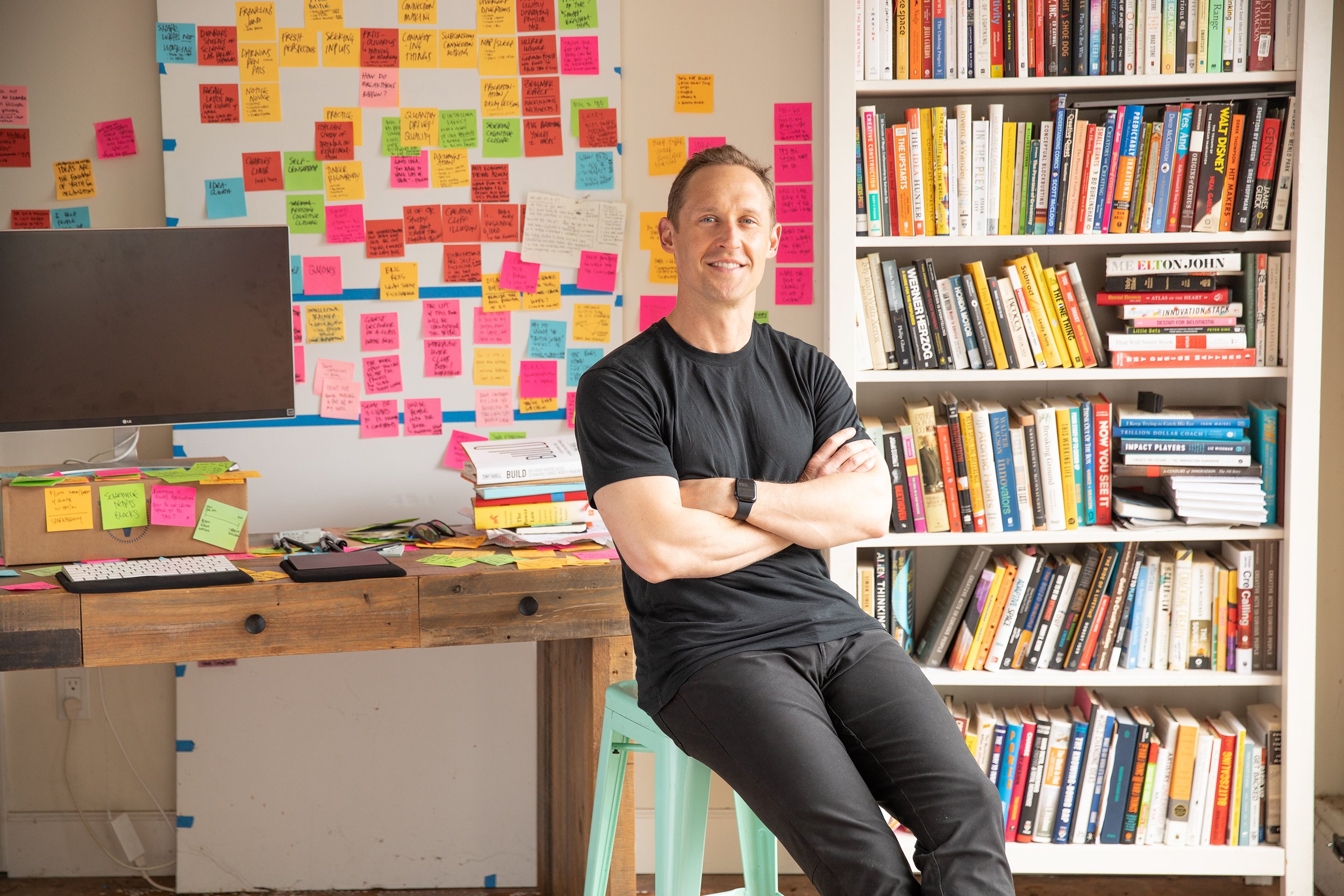
Methods of the Masters
A blog on the art & science of creative action.
Divergent Diversions
"The secret to doing good (work) is always to be a little underemployed. You waste years by not being able to waste hours."
-Amos Tversky, would-be winner of the Nobel Prize, father of behavioral psychology
To me, the unspoken key to Tversky's sentiment is knowing when to "waste" hours; certainly, not all wasted time is created equal. Sometimes folks dawdle when they should be working. But a deliberate diversion, strategically employed, becomes something much more than a waste: it can usher in a breakthrough. Einstein had his violin. Edison had his naps. Franklin had his Junto. Watson and Crick had their coffee. Tversky and Kahneman had their joke-filled-walks…
Try Brainspeedstormwriting!
One study found that most groups never generate more than two ideas in a typical brainstorming session. I'm a big believer in emphasizing quantity as a way to drive quality, so this was deeply troubling to me. I've mentioned the well-established tendency to "declare victory" too quickly, but two ideas??? I mean, come on...
One Benefit Of Failure
David Kelley often describes the challenge of problem solving in organizations by saying, "Fish don't know they're wet."
This is a somewhat haiku-istic (5 syllables, even!) way of saying that we become oblivious to the basic realities that affect us. This is especially important to acknowledge when we are trying to generate novel solutions, as cognitive biases can create associative barriers that limit ideational potential. If that previous sentence was slightly difficult to understand, then 1) I'm sorry, that's not cool, 2) I'll try to elaborate more at some point, but if you're curious you can learn more about the phenomenon in the classic "Lateral Thinking," or the more recent and very enjoyable "Medici Effect," and 3) definitely don't read the research paper from which the following was taken..
The Beginning Of The End...
I was struck by Steve Martin's own description of what caused the downfall of his stand-up routine. He was by most accounts the most popular comedian of the day, if not all time, when he abandoned the post.
"This was no longer an experiment; I felt a huge responsibility not to let people down. Arenas of twenty thousand and three-day gigs of forty-five thousand were no place to try out new material. I dabbled with changes, introducing a small addition or mutation here and there, but they were swallowed up by the echoing, cavernous venues...
Desirability In Decades
"The Idea Factory: Bell Labs and the Great Age of American Innovation" describes a key strategic shift that enabled Theodore Vail's celebrated turnaround of AT&T in the early 1900's, as anti-trust regulations threatened to make the innovator a relic. "In Vail's view, another key to AT&T's revival was defining it as a technological leader with legions of engineers working unceasingly to improve the system. As the business historian Louis Galambos would later point out, as Vail's strategy evolved, the company's executives began to imagine how their company might adapt its technology not only for the near term but for a future far, far away: 'Eventually it came to be assumed within the Bell System that there would never be a time when technological innovation would no longer be needed.' The Vail strategy, in short, would measure the company's progress 'in decades instead of years.’”…
Embracing the Outsider's Perspective
I've been seeking to understand what led to Albert Einstein's groundbreaking insights in the field of physics. The field had been assumed, only a few years before his arrival, to contain no more discoveries. So how did Einstein break through?
Absurd To Whom?
I've been seeking to understand what led to Albert Einstein's groundbreaking insights in the field of physics. The field had been assumed, only a few years before his arrival, to c”…
Monetize Unidentified Assets
“Perhaps a firm’s most valuable unrealized asset class is its insight into things they’re ‘really sick of’ as an organization: chances are, if they’re really sick of them, there are other organizations who are sick of them too.”
There’s another important unmonetized asset class, which very few companies sufficiently capitalize upon, and it’s one that’s closely associated with things ‘they’re really sick of’…
What Stinks?
One of the highlights of Jerry Seinfeld's fascinating conversation with Tim Ferriss was the simple observation of where great ideas come from. In it, Seinfeld speculates that the source of his comedy is his highly sensitive nature…
Entertain the Absurd
“If an idea does not sound absurd, then there’s no hope for it.”—Albert Einstein
I've heard that quote a number of times, and it obviously aligns with ideas I've shared here before. What I thought would be fun is to share a couple of noteworthy examples I've come across in my own research recently…
Reflect On Experimentation
Yesterday I mentioned the power of experimentation to drive ideation. One important note is, experimentation should not be only forward-facing. To say it differently, a deliberate practice of reflection will amplify the learnings we glean from experiments, and the impact that experimentation has on our exploratory trajectory…
Experimentation Begets Ideation
Jerry Seinfeld's fascinating conversation with Tim Ferriss sent me down a rabbit trail of fresh research and exploration. Of course comedians deal in ideas. Of course! But to think about their process as an "idea generating process" that I might glean insights from had just not occurred to me as clearly until now…
Make Something Every Day
The Picasso Museum in Barcelona is one of the coolest places I've ever visited. I was stunned to learn that Pablo Picasso created over 20,000 pieces of art in his career…
A Majority Of "Blind Alleys"
I was struck by a revealing criticism in Henri Poincaré’s otherwise glowing recommendation of Albert Einstein for an academic position in Zurich. It spoke to me of how subtly a conventional paradigm can sneak into our thinking about exploration…
Sharing Before You Feel Ready
One of the quirks of the creative process is that it's accelerated by "premature sharing.
We often see this in design workshops, especially among working professionals. We come to a "share out," where we are going to review folks' work, and ask for a show of hands: "Who feels ready to share with the group?" Almost always, not a single hand in the house gets raised…
On Hopelessness In The Creative Process
I may end up doing a short series on the fantastic "A Technique for Producing Ideas" which is, page-for-page, the single greatest guide for the practice of generating ideas that I have found. In it, James Webb Young give voice to what every individual pursuing a creative end has experienced: sometimes it feels like the answer will never come. He explains that hopelessness is every bit as important a step in the creative process as any other…
Creative Practice
A hallmark of the "not done, but begun" mentality is regular, disciplined practice. It's how we improve in any skillset, and creative thinking is no different.
From the fantastic "A Technique for Producing Ideas"…
To Get More Wood, Drop More Acorns
Speaking of gardening...
One of the things that's truly special about Amazon is their ability to build new businesses. You might even say it's their competitive advantage, the ability to build new businesses that seemingly have little to do with the original vision. Much has been written about this phenomenon, so I won't go into too much detail here…
The Garden Vs The Grocery Store
For all of the important benefits that the notion of "the design sprint" has conferred upon the corporate world, I think it has done the practice of innovation one great disservice: it has unintentionally implied that great ideas are easily come by, and are the function of episodic, momentary bursts of effort.
Nothing could be further from the truth…



















